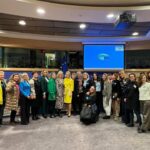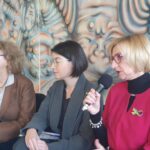
Professor Agnieszka Matusiak at the 8th Congress of Women in Brussels
On December 1-3, 2022, the 8th Polish Women’s Congress was held in Brussels. The Belgian Elles Sans Frontières Association organised the event in cooperation with professor Agnieszka Matusiak, head of the Research Center for Postcolonial and Posttotalitarian Studies at the Faculty of Letters of the University of Wrocław. This year’s Congress was held under the slogan, ‘Feministyczna Ukraina: nowe geopolityczne siostrzeństwo’ (Feminist Ukraine: a new geopolitical sisterhood). The event was held under the patronage of the Embassy of Ukraine in Belgium. Its strategic partners were the KANAL Center Pompidou in Brussels, the Ukrainian Institute in Paris, Université libre de Bruxelles (ULB), and the Brussels Anti-Violence Centre Elles pour Elles.
The first day of the Congress began with a debate in the European Parliament on ‘The Feminist Ukraine’, which was moderated by the Vice-Presidents of the European Parliament Evelyn Regner, Ewa Kopacz and Dimitrios Papadimoulis (link to the recording of the event). Ukrainian politicians also attended the debate: Deputy Prime Minister of Ukraine Olha Stefanishyna (online) and Commissioner for Gender Equality Kateryna Levchenko, who talked about how Ukraine continues its feminist and political process during the hostilities. Both pointed to the need for support from European institutions regarding Russia’s responsibility for war crimes committed in Ukraine. Another attendee, Sarah Schlitz, the Belgian Secretary of State for Gender Equality, underlined the impact that the Euro-Ukrainian sisterhood can have on political cooperation in the future.
Apart from politicians, Ukrainian women intellectuals also participated in the debate. Professor Łarysa Masenko from the Kyiv-Mohyla Academy in Kyiv emphasised the importance of building a decolonial Ukrainian culture, vice-rector of the University of Taras Shevchenko in Kyiv, dr Ksenia Smirnova stressed the importance of maintaining the intellectual condition of the Ukrainian nation by supporting the universities. Professor Alexandra Hrycak from the University of Portland spoke about the principles of law and transparency in rebuilding the country with the support of European institutions.
Furthermore, the writer Oksana Zabużo said that women are a visible part of the war in Ukraine, not only as refugees or survivors but also as soldiers and politicians. She also added that a new feminist historiography of this war is emerging before us. It is crucial that women actively participate in the reconstruction of peace after the war. At the end of the debate, prof Agnieszka Matusiak and dr Agata Araszkiewicz, president of the Elles Sans Frontières Association, pointed out that Polish women know very well what marginalisation means in creating historical transformation, which is why they actively support feminist Ukraine on the path of its decolonial changes.
Whereas on Saturday, December 3, 2022, the Congress took the form of Polish-Ukrainian panel discussions at the KANAL Center Pompidou thanks to the sincere support of its director, Kasia Redzisz. The issues of the panels concerned the situation of women in the armed forces of Ukraine, women as victims of wartime violence, the role of women’s leadership in the reconstruction of post-war Ukraine and the decolonial changes taking place as a result of the war in Ukrainian literature, drama, theatre, film and art due to women. It is worth paying attention to the mural prepared especially for the Congress by Kharkiv artist Veronika Hapchenko, the proceeds from which will be donated to the Ukrainian armed forces after the sale.
Besides the discussions, there were also other artistic events. The first day of the Congress ended with an evening of Ukrainian poetry at the ULB, prepared by the students of Polish studies under the substantive supervision of Professor Dorota Walczak-Delanois. On December 2, there was a performative reading of the monodrama by the Kyiv playwright Neda Nezhdana, titled ‘Kotka Donbasu. Pożegnalny monolog’ (translated into Polish by Agnieszka Matusiak) was directed and performed by Alicja Kochańska, an actress from the theatre ‘Teatr Jaracza’ in Olsztyn. At the end of the Congress, the Nieme Szaty Królowej group presented the performance ‘Przegrana na loterii’.
Three days of intensive congress activities, filled with the spirit of solidarity, empathy, care and mutual attention of women from various backgrounds (activists, creators, scientists, journalists, lawyers, sociologists, psychotherapists, cultural scientists, economists, etc.) clearly showed how many Polish and Ukrainian women could learn from each other and inspire each other to make the world a better place.
Translated by Gabriela Zimkowska (student of English Studies at the University of Wrocław) as part of the translation practice.









